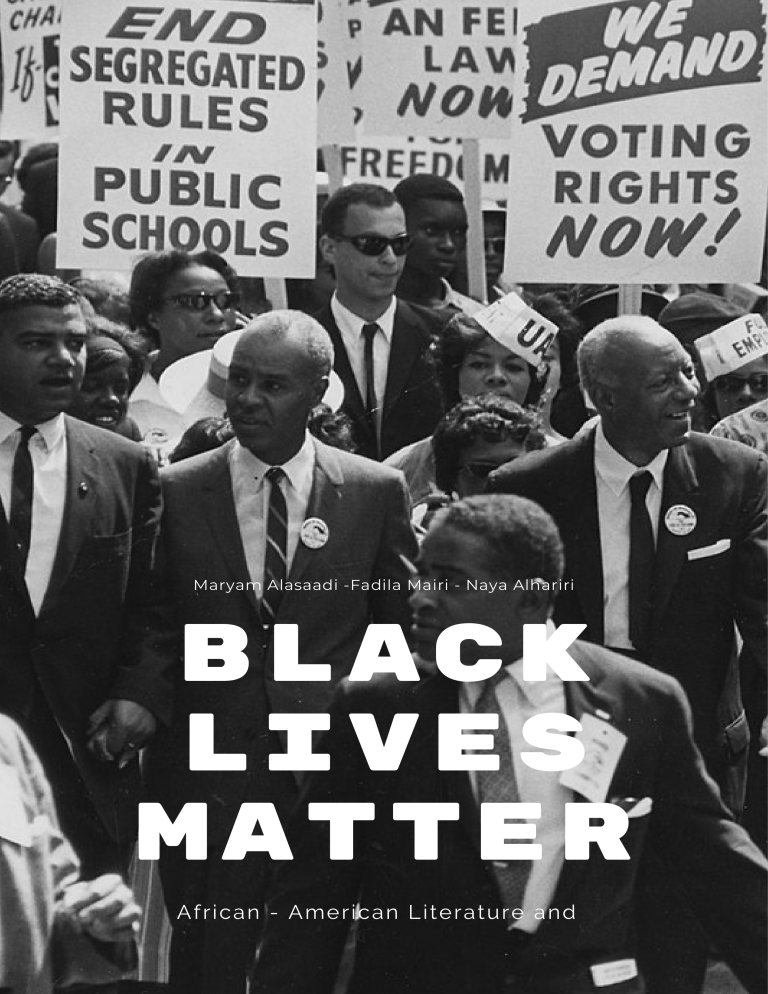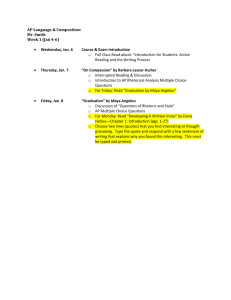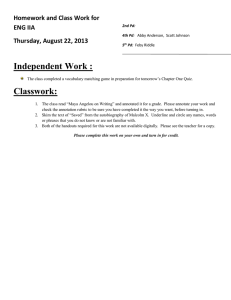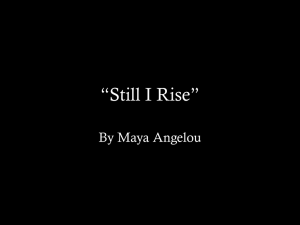
Maryam Alasaadi -Fadila Mairi - Naya Alhariri BLACK LIVES MATTER African - American Literature and TABLE OF CONTENTS Page 1...........................................................................................Introduction Page 2 ................................................................. Civil rights Movement Page 3........................................................ Black Lives Matter protest Page 4..........................................................."I Have A Dream" speech Page 5...................................................................Martin Luther King Jr. Page 6.........................................................................................."I too" poem Page 7.............................................................................Langston Hughes Page 8.........................................................."The Hate You Give" novel Page 9.....................................................................................Angie Thomas Page 10................................................................"If We Must Die" poem Page 11........................................................Mary Johnson (biography) Page 12-13...................................................Maya Angelo (biography) Page 14...........................................................................................Conclusion INTRODUCTION About seven-in-ten black Americans (71%) say they have personally experienced discrimination or been treated unfairly because of their race or ethnicity, including 11% who say this is something they experience regularly. The history of African Americans in the United States is marked by a long and painful legacy of racism and discrimination. Throughout history, African Americans faced various forms of oppression, including slavery, segregation, and systemic discrimination. Since the colonial era in America till this day, Black people and African Americans get racially discriminated against every day. This led to several movements and protests like the "Civil Rights Movement" and the "Black Lives Matter" protest. Also, this legacy of racism and inequality has had a profound impact on African American literature throughout the centuries. The literature produced by African Americans during this time serves as a way to shed light on their experiences and struggles with systematic discrimination and social injustice. Their writings were a way to empower others to not stay silent and take action. Some of this african american literature are stories like "The Hate You Give", poems like "I, Too" and "If We Must Die", powerful speeches, like "I Have A Dream", and many other pieces of literature that are written by African Americans where their literature have the same purpose which is to end the racism they suffer from. CIVIL RIGHTS MOVEMENT The Civil Rights Movement was a social and political movement in the United States during the mid-20th century that aimed to end racial discrimination and segregation against African Americans. The movement was led by prominent civil rights activists, such as Martin Luther King Jr., Rosa Parks, and Malcolm X, who advocated for nonviolent protests, sit-ins, and boycotts to bring attention to the issue of segregation. The movement also led to the passage of several important laws, such as the Civil Rights Act of 1964 and the Voting Rights Act of 1965, which aimed to end racial discrimination in public and private institutions and protect voting rights for African Americans. Although the Civil Rights Movement was a major step forward in the fight for racial equality, racism and discrimination still persist in many forms today, and there is still work to be done to achieve true racial justice. The Civil Rights Movement had a profound impact on American society, inspiring other social movements and bringing about significant changes in the country. The movement helped to raise awareness about the issue of racial discrimination and segregation, and it paved the way for other marginalized groups to fight for their own rights. The movement also brought about changes in the way African Americans were portrayed in the media, with more positive and accurate representations of black people in movies, television shows, and other forms of media. Although the Civil Rights Movement was a challenging and often dangerous time for those involved, it was a critical moment in American history that helped to shape the country we know today. BLACK LIVES MATTER PROTEST The Black Lives Matter movement is a social movement that began in 2013 after the acquittal of George Zimmerman in the shooting death of Trayvon Martin. The movement seeks to raise awareness about the systemic racism and violence that Black people face in the United States. In 2020, the Black Lives Matter movement gained renewed attention following the killing of George Floyd, a Black man who died while in police custody in Minneapolis, Minnesota. Floyd's death sparked protests across the United States and around the world, with people calling for an end to police brutality and systemic racism. The protests in 2020 were some of the largest and most sustained protests in U.S. history, with millions of people participating in marches, rallies, and other demonstrations. Many of the protests were peaceful, but some turned violent, with clashes between protesters and police, looting, and property damage. The protests in 2020 were some of the largest and most sustained protests in U.S. history, with millions of people participating in marches, rallies, and other demonstrations. Many of the protests were peaceful, but some turned violent, with clashes between protesters and police, looting, and property damage. The protests brought renewed attention to the issue of police brutality and systemic racism in the United States. They also sparked a national conversation about the role of police in society and the need for systemic change to address the root causes of racism and inequality. The Black Lives Matter movement and the protests in 2020 have had a significant impact on American society, sparking changes in policies and practices at the local, state, and federal levels. While there is still much work to be done to address systemic racism and inequality, the movement has helped to raise awareness about these issues and has inspired many people to take action to create a more just and equitable society. I HAVE A DREAM "I Have a Dream" i s one of the most p ow erful and influ ential sp eeches i n American history, delivered by Martin Luther King Jr. du ring t he Mar ch on Washington on August 28, 1963. The sp eech w as a call f or rac i al eq ual i ty and an end to discrimi nation a gainst African Am ericans. In the speech, Dr. King spoke of his vision for a future where all people, regardless of their race or ethnicity, would be treated equally and with respect. He spoke of a world where his children would not be judged by the color of their skin, but by the content of their character. Dr. King's speech was a powerful and inspiring call to action. It galvanized the civil rights movement and helped bring about significant changes in American society. The speech is still studied and celebrated today as a testament to the power of words and the importance of fighting for justice and equality. One of the most memorabl e l ines f rom the sp eech is " I have a d r eam t hat one day this nation will rise up and live out the true meaning of i ts cr eed : 'We hold these truths to be sel f-evident, that all men are crea ted eq ual . ' " This line captures the essenc e of Dr. King's vision f or a more just and equitable society. Overall, "I have a d ream" i s a powerful and moving sp eech tha t cont i nues t o inspire people a round the world. I ts message of hop e and uni t y i s as relevant today as i t was over 5 0 y ears ago, and it serves as a r emi nd er of the work that st ill need s to be done to achieve true eq uality and j usti ce f or all people. MARTIN LUTHER KING JR. Martin Luther King Jr. was a n i nsp iring Am erican Bap tist minister and a prominent leade r i n the civil rights movement f rom 1954 until hi s tr agi c assassination in 1968. Born on Janu ary 15, 192 9, in Atlanta, Geor g i a, K i ng was the son and grandson of Bap tist ministers. He was a gifted student and earned his PhD in theology from Boston University in 1955. King became a pastor at the Dexter Avenue Baptist Church in Montgomery, Alabama, where he became involved in the civil rights movement. He played a pivotal role in the Montgomery Bus Boycott, which began in 1955 after Rosa Parks was arrested for refusing to give up her seat to a white person on a Montgomery bus. King went on to become a leader in the Southern Christian Leadership Conference, which was founded in 1957 to coordinate civil rights activities. He was a key figure i n many of the most im p ortant events of the ci vi l r i g ht s movement, includ ing the March on W ashington in 1963 , w here he d el i ver ed his famous "I Ha ve a Dream" speech. King w as a p ow erful advocat e f or nonviolent resista nce, a nd he believed that civil disob edience w as the most effective wa y to bring a bo ut change. H e w as a tireless w or k er f or social justice, and he wa s i nstrumental in the p assage of the Ci vi l Ri g ht s Act of 1964 and the Voting Rights Act of 1965. King's assassination on April 4, 1968, in Mem p his, Tennessee, w hi l e he w as in town to support a sa nitation w orkers' strike, w as a shocking event that deeply affected the nation. Ki ng's legacy of nonviolent resista nce and hi s commitment to social j ustice c ontinu e to inspire p eop le arou nd t he w or l d . I, TOO "I, Too" is a poem by Langston Hughes that was published in 1926. The poem is a powerful expression of the African American experience, and it speaks to the themes of identity, perseverance, and hope. In the poem, the speaker declares that despite being "the darker brother," he too is an American and deserves to be treated with respect. He acknowledges the history of slavery and discrimination that has been inflicted upon his people, but he also asserts his own strength and resilience. The speaker declares that although he is currently relegated to the kitchen when guests come to the house, someday he will be at the table with the other guests, and they will be ashamed of the way they treated him. The poem is a powerful sta tement of the African Am erican strugg l e f or equality and dignity. It speaks to the them e of identity, as the sp eak er asserts his own worth a nd d eclares that he is an Am erican too. It al so speaks to the theme of perseverance, as the sp eaker acknowl ed g es the challenges that he fa ces but also exp resses his determ ination to over come them. Finally, the poem spea ks to the them e of hop e, as the sp eak er l ook s forward to a fut ure i n which he w ill b e treated w ith the respect that he deserves. Overall, "I, Too" is a powerful a nd inspiring p oem that continues t o r esonat e with readers today. It i s a testa ment to the strength and resilience of the African American c ommuni ty, and it is a rem inder of the ongo i ng st r ugg l e for equality and j usti ce. Langston Hughes Langston Hughes was an American poet, novelist, and playwright who was born in Joplin, Missouri, in 1902. He was one of the most prominent figures of the Harlem Renaissance, a cultural movement that celebrated African American art, music, and literature. Hughes's parents separated when he was young, and he moved frequently throughout his childhood. He began writing poetry in high school, and after graduating, he spent a year in Mexico with his father, who hoped that he would study engineering. However, Hughes was more interested in writing, and he returned to the United States to attend Columbia University. In 1921, Hughes left Columbia and moved to Harlem, where he became involved in the literary and artistic scene. He published his first poem, "The Negro Speaks of Rivers," in 1921, and his first book of poetry, "The Weary Blues," in 1926. Hughes went on to publish numerous books of poetry, as well as novels, plays, and essays. Hughes's work often focused on the experiences of African Americans, and he was known for his use of vernacular language and his celebration of Black culture. He was also an activist and a champion of civil rights, and he used his writing to advocate for social justice. Hughes died in 1967, but his work continues to be celebrated for its powerful and enduring messages of hope, resilience, and the struggle for equality. "The Hate U Give" by Angie Thomas "The Hate U Give" is a young adult novel by Angie Thomas that tells the story of Starr Carter, a 16- year old black girl who lives in a poor, predominantly black neighborhood called Garden Heights, but attends a predominantly white private school. Starr witnesses the fatal shooting of her unarmed friend, Khalil, by a white police officer, and the book follows her as she grapples with the aftermath of the shooting and its impact on her community. The novel explores themes of police brutality, systemic racism, and the Black Lives Matter movement, as Starr becomes an activist and speaks out against the injustices she sees around her. Through Starr's journey, the book also examines issues of identity, family, and the complexities of growing up in a world that often seems stacked against you. Description about the author: Angie Thomas is an American author who was born and raised in Jackson, Mississippi. She studied creative writing at Belhaven University and earned her BFA in Film and Television from the University of Mississippi. "The Hate U Give" is her debut novel, and it was inspired by the Black Lives Matter movement and the shooting of Oscar Grant by a police officer in 2009. Thomas has been praised for her powerful storytelling and her ability to tackle complex issues with nuance and empathy. She has won numerous awards for her work, including the William C. Morris Award, the Michael L. Printz Award, and the Coretta Scott King Award. "The Hate U Give" has received critical acclaim for its powerful storytelling and its honest portrayal of issues related to race and police brutality. The book has been on the New York Times bestseller list for over 200 weeks, and it has been adapted into a feature film starring Amandla Stenberg and Regina Hall. "if we must die" by Claude Mckay "If We Must Die" is a poem by Claude McKay that was written in 1919 in response to wave of racial violence and lynchings that swept across America in the early 20th century. The poem is a powerful class for resistance and injustice. The poem begins with the speaker addressing his fellow black people, urging them to fight back against their oppressors. The speaker acknowledges that they may be outnumbered and outgunned, but he insists that they must fight back regardless. He tells his audience that if they must die, they should do so with dignity and honor, rather than as helpless victims. The poem goes on to describe the struggle that black people face against their oppressors. The speaker describes the violence and brutality that they have endured, and he calls on his audience to stand up for their rights and to fight back against their oppressors. He tells them that they must be brave and unafraid, even in the face of death. Throughout the poem, the speaker uses vivid and powerful imagery to convey his message. He describes the oppressors as "mad and hungry dogs" and "bloody butchers," and he urges his audience to fight back against them. He tells them that they must be willing to face death in order to achieve their freedom, but he also reminds them that their struggle is not in vain. Overall, "If We Must Die" is a powerful and inspiring poem that calls for resistance and defiance in the face of oppression and injustice. It has been celebrated as a classic example of African American literature and has inspired generations of activists and freedom fighters. CLAUDE McKay Claude McKay was a Jamaican-American writer and poet who was a leading figure in the Harlem Renaissance, a cultural movement that flourished in the 1920s and 1930s. McKay was born in Jamaica in 1889 and moved to the United States in 1912. He was an important voice in the African American literary community and wrote extensively about issues of race and identity. McKay's poetry was characterized by its powerful imagery and its exploration of themes such as oppression, injustice, and resistance. His work was deeply influenced by his experiences as a black man in America, and he was a passionate advocate for civil rights and social justice. McKay was also involved in leftist politics and was a member of the Communist Party for a time. He was a prolific writer and wrote several novels, as well as poetry and essays. His work has been widely anthologized and has had a lasting impact on African American literature and culture. Mary Johnson short biography Born in the early 1900s in the southern United States, Mary Johnson faced racism and discrimination from a young age. Despite this, she was a determined and hardworking individual who dreamed of becoming a nurse. Mary faced many challenges in achieving her ambition, including being denied access to education and employment opportunities because of her skin color. Although she faced significant obstacles, Mary never gave up her aspirations. She worked odd jobs and saved every penny to pay for nursing school. However, even after graduating, Mary struggled to secure a job because many hospitals and medical facilities would not hire African Americans. Determined not to be deterred, Mary went on to train as a midwife, providing crucial support to expecting mothers and newborns in her community. Over the years, her dedication to helping others earned her a reputation as a respected and beloved member of her town. Despite the injustices she faced, Mary never gave up hope for a better future. Maya AnGelou short biography Maya Angelou was a celebrated novelist who also performed as a dancer, singer, activist, and scholar. Her distinctive and innovative autobiographical writing style is what made her most well-known. Marguerite Ann Johnson, better known as Maya Angelou, was born in St. Louis, Missouri, on April 4, 1928. Early on, Angelou moved to Stamps, Arkansas to live with her paternal grandmother as a result of the turbulent marriage and subsequent divorce of her parents. Bailey, her older brother, gave Angelou the name "Maya." When Angelou was seven years old, her mother's lover briefly took her back into her mother's custody. After being imprisoned, he was killed shortly after being let out. Angelou became silence for six years because she thought the man's death was caused in part by her disclosure of the tragedy. She once more resided in Arkansas with her grandmother during her mutism and into her teenage years. From a young age, Angelou's enthusiasm in literature and the English language was clear. She journaled and produced essays and poetry throughout her youth. She developed a passion for poetry after she got back to Arkansas and memorized poems by Poe and Shakespeare. Angelou returned to living with her mother, who was at the time residing in Oakland, California, just before the onset of World War II. She studied acting and dance at the California Labor School while attending George Washington High School. Angelou submitted an application to the Women's Army Corps when war broke out. Her membership in the California Labor School, which was thought to have connections to the Communist Party, led to the rejection of her application, nevertheless. Even though she was only 15 years old, she made the decision to apply for a job as a streetcar conductor because she was determined to get employment. Because so many men left their employment to join the military, women were able to replace their places. However, Angelou's race initially disqualified her from applying. She wasn't deterred, though. She asked for a job application every day for three weeks, but it was never granted. The business finally gave up and gave her an application. She wrote that she was 19 because she was under the legal working age. The first African American woman to work as a streetcar conductor in San Francisco, she was hired after being accepted for the post. After working for a semester, Angelou made the decision to go back to school. In the summer of 1944, she received her high school diploma from Mission, and shortly after, Clyde Bailey (Guy)Johnson, her sole child, was born. After receiving her degree, Angelou worked a variety of odd jobs to help support her and her son. She wed Tosh Angelos, an electrician in the US Navy, in 1949. Despite the divorce from her husband in 1952, she took on a variant of his last name and kept it throughout her life. Additionally, Angelou was renowned for her prowess in the calypso and cabaret dance genres. She sold LPs of her recordings during the 1950s while performing professionally in the US, Europe, and northern Africa. I Know Why the Caged Bird Sings, an autobiography of Angelou's early childhood, was released in 1969. Her account of finding personal courage in the face of bigotry and childhood tragedy struck a chord with readers and earned her a National Book Award nomination. Due to its graphic portrayal of sexual assault, many schools attempted to have the book banned; yet, it is credited with encouraging other abuse survivors to share their own tales. Over a million copies of I Know Why the Caged Bird Sings have been sold globally and have been translated into many different languages. Later, Angelou released six more autobiographies, the last of which being Mom & Me & Mom (2013). She published several collections of poetry, including the Pulitzer Prize-nominated Just Give me a Drink of Water 'fore I Diiie (1971), and several anthologies of essays. Additionally, she recorded spoken poetry albums, such as "On the Pulse of the Morning," for which she received a Grammy Award for Best Spoken Word Album. Written and read at President Bill Clinton's inauguration in 1993, the poem was first published. She also received Grammy awards in 1995 and 2002 for her spoken poetry CDs. On theater and in the movies, Angelou worked as a writer, actor, director, and producer, among other things. With the release of Georgia, Georgia, she became the first African American woman to have her screenplay converted into a movie. In 1973, Jerome Kitty's play Look Away won Angelou a Tony nomination for her supporting performance. In 1977, she played Kunta Kinte's grandmother in the television miniseries Roots. Numerous organizations both domestically and internationally honored her for her literary accomplishments. Wake Forest University presented Angelou with an offer for the Reynolds Professorship of American Studies in 1981. In 2000, President Clinton presented Angelou with the National Medal of Arts. She was a part of the first group of writers to be inducted into the Wake Forest University Writers Hall of Fame in 2012. She was given the Literarian Award for Outstanding Service to the American Literary Community the following year by the National Book Foundation. In addition, Angelou delivered numerous commencement addresses and received more than 30 honorary degrees during her lifetime. On May 28, 2014, Angelou passed away. The Wake Forest University and Glide Memorial Church in San Francisco both organized memorial services in her honor. In 2015, the US Postal Service released a stamp bearing her image as a tribute to her legacy. (The US Postal Service includes a quote on the stamp that was originally penned by Joan Walsh Anglund but has long been credited to Angelou.) The highest civilian award in the nation, the Presidential Medal of Freedom, was given to Angelou by President Barack Obama in 2011. It was a deserving tribute to Angelou's outstanding and inspirational artistic career. conclusion Throughout history, African Americans have been subjected to racism, from the days of slavery to the Civil Rights Movement and beyond. While significant progress has been made, the Black Lives Matter movement is a reminder that there is still much to be done to achieve true equality. African American literature has played an important role in shedding light on the struggles and successes of the community and continues to inspire and educate readers to this day. It is essential to acknowledge the significant contributions of African Americans and strive toward a future where everyone is treated with dignity and respect. Tasks Maryam- Magazine Design/Introduction/Black lives matter/ I Have A Dream/ I Too Naya- civil rights movement/ The Hate You Give/ If We Must Die Fadila- biographies of Mary Johnson and Maya Angelou



